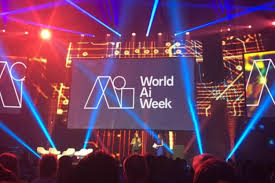07
10
.25
World AI Week 2025: Reflections from CDT Students and Alumni

What’s World AI Week?
World AI Week is the world’s leading week-long gathering of the global AI community, with 50+ events across business, science, technology and networking.
From 6–10 October 2025 in Amsterdam, 15,000+ attendees will explore how AI is transforming society, driving innovation and creating new partnerships.
To celebrate this global conversation, we asked CDT students and alumni to share their thoughts on AI. From career journeys to breakthrough ideas, their reflections show how AI is inspiring change, opening doors and shaping the future in ways both big and small.
Their reflections reveal how AI continues to inspire change, open doors, and redefine what’s possible in fields from healthcare and education to leadership and law.
How our students and alumni see the future of AI:
Responsible AI / Ethics & Responsible Development
Alfie Cameron (2018 cohort) reflects on how responsible AI can drive real-world impact, supporting creativity, collaboration and meaningful societal change.
“AI is – at present – a myth. What we commonly call AI in our day-to-day conversations covers a range of algorithms, machine learning, and generative processes that mimic human ability to reason through processing data, adapting to the outputs, and making decisions based on the outcomes. Our job as researchers is to ensure these technologies are given appropriate, representative data and are taught to process it in ways that align with the values of the community it serves. It is also our job to ensure that AI is employed in ways that understand its limitations, recognising it as a tool that supports humans to continue to create, collaborate, and achieve”.
AI and the Future of Work
Vincent Bryce (2019 cohort) shares why upskilling leaders and reflecting on values is key in an AI-first world.
“As agentic AI advances, firms are adopting ‘AI-first’ approaches, shifting the burden to managers to justify not using AI. This disrupts traditional concepts of ‘people management’ and workforce planning and demands a deeper reflection on organisational values. Upskilling leaders to understand the technical and team dynamics involved will be crucial”.
Responsible AI in Healthcare
Angie Higgins (2022 cohort) explores AI’s potential in healthcare while warning against overreliance and urging a more responsible path for AI development.
“In my work I use sensors and machine learning to identify (and hopefully in the future predict) spikes in chronic pain, and there are many other AI systems which could benefit patients and healthcare professionals. However, it is not an infallible cure-all and overreliance on these systems will inevitably lead to catastrophic failures, particularly as people with vested interests speak about these technologies as god-like and all-knowing. I believe AI can be used responsibly and for the benefit of humanity, but I have grave concerns about the current direction of AI development”.
Ethics and Responsible Development
Angela Thornton (2019 cohort) reflects on AI’s rapid rise, it’s astounding potential and the urgent need to build ethical and regulatory frameworks that keep pace.
“As an individual who is fascinated by science and technology and did her PhD on mind uploading, I find the developments in AI and its future capabilities astounding. However, as a researcher I am only too aware of the challenges we face trying to ensure AI is developed ethically and in a way that benefits humanity”.
When I started my career, AI was the stuff of science fiction, whereas now it is embedded in every aspect of our daily lives. While the speed of AI’s development is impressive, it is also a challenge given the time it takes to develop ethical and regulatory frameworks”.
Responsible AI and Policy
Ellie Colegate (2021 cohort) reflects on AI’s rapid spread across sectors and its daily impact on users.
“The advancements we have seen in relation to artificial intelligence over the past few years have demonstrated how rapid change can be. The use of these technologies has spread across multiple sectors, from administration to entertainment, and with that spread come unique challenges and opportunities. It is clear that AI is not going anywhere soon and has become part of users’ daily interactions. This is concerning when considering children and their interactions with AI bots and integrated services, and it is encouraging to see researchers and advocates prioritising children’s and young people’s needs in these discussions. From a broader regulatory perspective, it is exciting to observe developments worldwide as multiple jurisdictions grapple with how to regulate both the technology itself and the actors involved. It presents a new legal challenge for many and exemplifies the ongoing relationship between law and technology, where each continually evolves to keep pace with changing environments and realities. I am optimistic about what AI may bring in terms of new regulations, but I am cautious about the potential impacts on users”.
Originally posted at https://cdt.horizon.ac.uk/2025/10/07/world-ai-week-2025-reflections-from-cdt-students-and-alumni/














